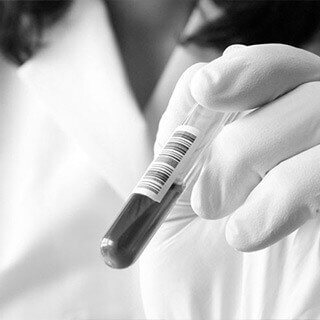Is a "Liquid Biopsy" on the Horizon for Cancer?
 April 2015
April 2015
Incisional and excisional biopsies may one day seem as archaic as bloodletting and snake oil – or at least that’s the hope. There is preliminary evidence that a simple blood draw will someday enable oncologists to quickly figure out whether a treatment is working and, if it is, to continue monitoring the treatment in the event the cancer develops resistance.
Researchers in labs across the country are currently testing a potentially game changing advance they are calling the liquid biopsy. New developments in extremely sensitive techniques for examining DNA in a patient’s blood are making this possible.
The idea for the test grew out of a discovery made years ago about fetuses. They shed little pieces of DNA into the bloodstreams of mothers-to-be, which led to the discovery that all growing cells, including tumors, shed tiny DNA fragments.
“This could change forever the way we follow up not only response to treatments but also the emergence of resistance, and down the line could even be used for really early diagnosis,” said Dr. José Baselga, physician in chief and chief medical officer at Memorial Sloan Kettering Cancer Center.
A National Cancer Institute study published this month in The Lancet Oncology, involving 126 patients with the most common form of lymphoma, found the test predicted recurrences more than three months before they were noticeable on CT scans. The liquid biopsies also identified patients unlikely to respond to therapy.
Researchers caution that more evaluations of the test’s accuracy and reliability are needed. So far, there have been only small studies in particular cancers, including lung, colon and blood cancer. But early results are encouraging.
Breast cancer surgeon and author Dr. Susan Love sums this latest discovery up by saying, “I love that they call a blood test a “liquid biopsy”! This is interesting, but not ready for prime time yet! What we need to know is whether all of the cells in the blood actually become metastatic, or do some die along the way, or when they get where they are going? It is like immigrants moving to a new land … not all who set out on the journey make it.”







